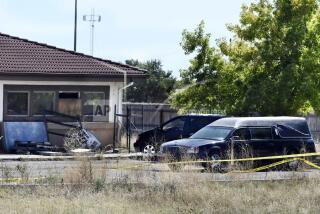ID, Recovery of Bodies Likely to Take Months
- Share via
NOBLE, Ga. — Georgia state officials said Wednesday it will take at least eight months and a “staggering” amount of money to recover and identify the hundreds of bodies they expect to find at the Tri-State Crematory.
The cost will include draining a 12-to-15-acre lake on the crematory grounds, where officials said an underwater camera found a torso and a skull submerged about 20 yards from the shoreline.
The massive canvass of the 16-acre grounds and the nearby home of crematory operator Brent Marsh has cost the state about $5 million. So far, law enforcement officials have recovered 242 corpses--a number certain to rise as they continue opening six steel vaults they say are crammed with bodies.
Marsh, 28, remains in the Walker County Jail on a suicide watch and has waived his right for a speedy arraignment while he looks for an attorney, officials said. Dist. Atty. Herbert “Buzz” Franklin said that he intends to charge Marsh, already facing 16 counts of felony theft, with additional violations for every body that is identified.
But aggrieved families are seeking civil recourse. At least two class-action lawsuits were filed this week and a third is expected today.
One filed in Cleveland, Tenn., on Tuesday seeks $100 million from Marsh and Tri-State for the “depravity” of failing to cremate the body of a local woman who died in November 2000. The other, filed Wednesday in LaFayette, the Walker County seat, asks unspecified damages alleging Marsh returned containers with “ashes, sticks, insects, sand, gravel, ground masonry particles and other things” to four people who paid $1,020 for the cremation of their loved ones.
Both lawsuits also name Cleveland-based Buckner-Rush funeral homes, which contracted the cremations to Tri-State, and Prime Succession Holdings Inc., the parent company, as co-defendants for failing to make sure the cremations were performed.
Tests have identified 35 of the bodies, and revealed that 29 families received urns “adulterated” by foreign materials like cement dust or the ashes of someone other than their dead relatives.
Gary McConnell, director of the Georgia Emergency Management Agency, warned that the financial burden to taxpayers will be steep.
He said the first five days of the investigation have already cost the state about $1 million a day in equipment rental, hotel rooms and overtime pay for the 500 employees on the Tri-State case. The labor-intensive work of digging up and identifying the bodies will require a “long-term” commitment of at least eight months, said McConnell, who compared the task to the agency’s assignment of identifying and returning 474 bodies washed out of cemeteries during the 1994 floods in Albany, Ga.
“I assure you we’re a very expensive operation,” McConnell said. “The cost is going to be staggering.”
He declined to give an estimate until after he meets with Gov. Roy Barnes today to talk about the scope of the operation but vowed it would include draining the lake.
Deputies continue to find bodies behind Marsh’s house. They found a coffin with remains and a mound with at least 10 corpses. That discovery, made Tuesday, was in addition to the scores of bodies found in pits and vaults on the crematory grounds and homestead of Marsh’s parents, Ray, 75, and Clara, 69.
McConnell said he’s awaiting the results of water quality tests before sending in divers, and is working with the state’s Environmental Protection Division to figure out how much water the lake holds and how it should be removed.
*
Times researcher Edith Stanley contributed to this report.
More to Read
Sign up for Essential California
The most important California stories and recommendations in your inbox every morning.
You may occasionally receive promotional content from the Los Angeles Times.













